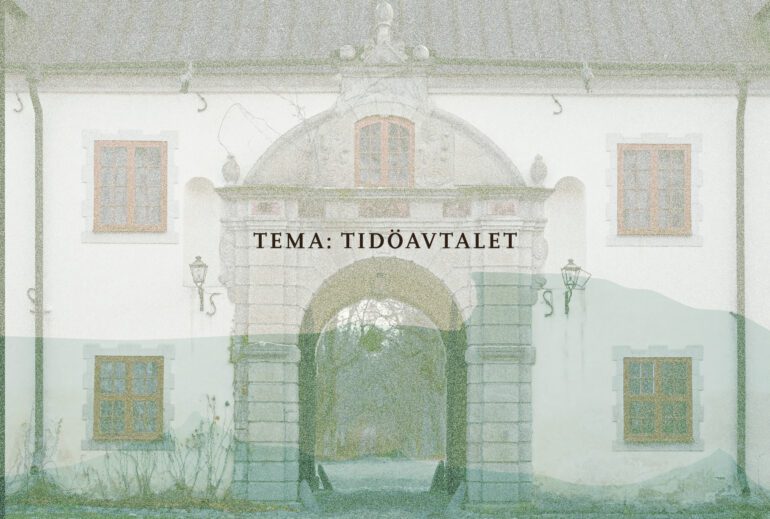by Rûnbîr Serkepkanî. This text is originally in Swedish, and published in Artikel 14, #4 2022. Translation into English by George Farrants.
We are sitting close together in a small church at Rinkeby, with coffee and snacks. At an initial glance, it could be a lecture, gathering or meeting of any club or society. Gentle rain is falling outside. A few children are being looked after by an elderly lady. A passage has been opened across the room to act as a fire escape. All of the 45 undocumented Iranian converts are anxiously waiting to hear what the four representatives from FARR have to say. If they can offer something to convince the Swedish Migration Agency to believe them. Believe in the authenticity of the many different pathways they took to finding Jesus.
This is the “I am a Christian too” campaign. Many local and international newspapers have written about this campaign, and it has organised four demonstrations in Stockholm. They stood outside the Swedish parliament with posters and banners, and collected 5,000 signatures. Carola joined the demo for a day. And on another occasion they met Ebba Busch. They described the many forms of persecution they would face if sent back to Iran. They told about their desire to be able to go to church on Sundays, baptise their children openly, to follow the pathway revealed to them by Jesus in the many and various relationships that each one of them has with him, and to be buried in consecrated ground when the time comes. Things that members of the Church of Sweden have the luxury of forgoing. Things that the case officers from the Swedish Migration Agency who interviewed them and assessed their cases may not even care about.
Sometimes, the illusion of continuity is enough to be able to create a decent life. But as undocumented people, they have been deprived also of this illusion.
Many of these converts have been in Sweden a long time. Some of them must wait a few months before being able to apply again for a residence permit, while others must wait years. Children have been born into this limbo and started school. People have grown old and some have been broken down, if not by the absence of a future and being in a permanent state of uncertainty, dread and anxiety, then by the inexorable passage of time. They have not been able to take on a job, undergo education, learn a new language or compose music. This period has been stolen from them, when whatever they were doing could be interrupted at any moment. Sometimes, the illusion of continuity is enough to be able to create a decent life. But as undocumented people, they have been deprived also of this illusion.
The evening before the meeting we had sat down and read through decisions that the Swedish Migration Agency had taken about the participants’ fate. In most cases, the Swedish Migration Agency had accepted that they really had been members of secret Christian cells in Iran, been baptised in Iran, Pakistan, Indonesia, Sweden or another country, and that they are now active in Swedish congregations. But the case officer, who may not be Christian or in any way religious, seeks deep intellectual reflections into the bible and the Christian faith during the interview. When faced with people who have revealed their unique and special relationship with their faith, the case officers at the Swedish Migration Agency may catch a detail that seems strange in the case officers’ view of the world, and will then use that detail to destroy the life destiny that has been openly placed before them.
An observer with inside knowledge has told me jokingly that even Jesus would not be able to convince the Migration Agency.
Unlike the practice set down by the Swedish Migration Agency, there is no pathway to Jesus that is more authentic than any other. Although I am not Christian, I am always fascinated when people describe the way in which they found Jesus. One friend found Jesus after being involved in a motorbike accident. He became a Christian as he flew through the air over a car with his motorbike. His chances of convincing the Swedish Migration Agency would probably be zero! And then there’s the case of Paul, who saw a bright light on the road to Damascus and was totally changed by the experience. How should he report to the Swedish Migration Agency that he was converted from one who tortured and persecuted Christians to one of the greatest Christian reformers, without any other Christians being in the vicinity? Imagine the Migration Agency’s decision. An observer with inside knowledge has told me jokingly that even Jesus would not be able to convince the Migration Agency. This person has worked with such questions for many years and experienced unceasing frustration.
The agency does not seem to care that hundreds of thousands have been converted to Christianity in Iran, and that more people have converted than have been traditionally Christian. Sweden does not deport Iranians who do not want to return to Iran, but does not hesitate to place them into a life of stolen time. One of the participants in Rinkeby wonders then why the Agency says that they must leave the country and report to the authorities for deportation. The answer is that the Agency has quite simply omitted to provide the correct information. Nor does it seem to care about the frequent criticism of its treatment of Iranian converts and other vulnerable groups that it receives from various organisations, institutions and others active in these questions, both on the EU and the global level.
The Agency is not concerned about their religious faith, or even that they have renounced Islam.
The Swedish Migration Agency knows that converts to Christianity are persecuted in Iran. All it has done is to create a very narrow framework to define who it considers to be a true convert. In their view, people have become members of a church, been baptised, joined secret persecuted communities, found Jesus and everything else, simply so that they can stay in Sweden. The Agency sees its job as dissecting in minute detail the fates of these people using assessment scalpels, cutting them into strips and shreds in order to find the one flaw that proves that their faith is not authentic, that their relationship with Jesus has been invented to ensure that they will be granted asylum. The Agency is not concerned about their religious faith, or even that they have renounced Islam.
The recurring theme during the informal discussions after the meeting is to understand exactly why they were mistrusted despite having shared with the Agency in deep confidence and trust the narrative of their lives and their beliefs. The pointed out how this could be used to reject their asylum application.
“What can I do about having received the embrace of Jesus, and the fact that he is now everything to me?”, one woman asks me. According to the Swedish Migration Agency, her statement is not a “deep reflection”, and this is why she is undocumented. Her daughter is now nineteen and suffers from panic attacks. She asks me whether her daughter can stay in Sweden if she, the mother, is allowed to stay.
I want to ask her “How can they not believe you: how can they not let you stay? The uncertainty you are experiencing must come to an end. Of course you must be free to express your love for Jesus, to enjoy the community in your congregation, to live a life in Jesus. Your daughter must be freed from dread: she must find peace here, and plant trees from which your grandchildren will eat the fruit. This is how it must be!”
But all the FARR representatives can say is that the EU has decided that the framework for assessing converts should be changed across the whole of the EU, so that the unique ways in which people find a new faith will be included. And that Sweden, which held the presidency of the EU Council of Ministers in the first half of 2023, is in a position where it cannot easily ignore the new framework. So next time they can apply for a residence permit, whenever that is, it’s possible that the decision-makers will come to a different assessment. There is hope in this message, but it can do nothing to recreate everything that these people have lost. They will not be compensated for the slave wages they have been forced to accept as undocumented people, nor for the panic attacks they have suffered, nor all the time that has been stolen from them.





